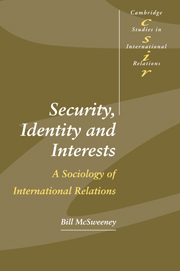Introduction
Published online by Cambridge University Press: 22 September 2009
Summary
Security is a slippery term. It is employed in a bewildering range of contexts and to multiple purposes by individuals, corporations, governments and academic specialists. It is enlisted to refer to things and people, to means and ends, to external events and innermost feelings.
Its recruitment by professional theorists and policy-makers to their particular interest in modelling and practicing international relations has given it a narrow, tangible objectivity which has slipped easily into popular understanding. But this technical usage should not stop us raising questions about how a term which evokes so much of the complexity and richness of routine, human, relations can be fixed in a definition which excludes reference to the normal, the commonplace, the everyday. In the past decade, moreover, the need for a radical rethinking of security has materialized in the emergence of particular events which have not been amenable to satisfactory explanation in traditional terms.
This book can be viewed as a general response to such events and to the fundamental problem of security which they signal. More specifically, it arises out of a sense of puzzlement in regard to particular international security issues and the explanations available in the academic literature. The puzzle sprang from events which followed the ending of the Cold War, which were clearly matters of security, but the facts of which could not be accounted for satisfactorily within the conventional framework. The attempt to do so pushed the analysis progressively back to the need to rethink the concept of security.
- Type
- Chapter
- Information
- Security, Identity and InterestsA Sociology of International Relations, pp. 1 - 12Publisher: Cambridge University PressPrint publication year: 1999
- 1
- Cited by

